Alright, it’s official now—I’m wholeheartedly committed to a career transition into the tech industry and, even more so, dedicated to embracing a minimalist lifestyle while pursuing financial freedom.
A few months ago, I rented a tiny 4-square-meter room with no windows and no wardrobe in a shared apartment with two young doctors. The apartment is conveniently located near the bootcamp-style school where I’ll be studying for the next year.
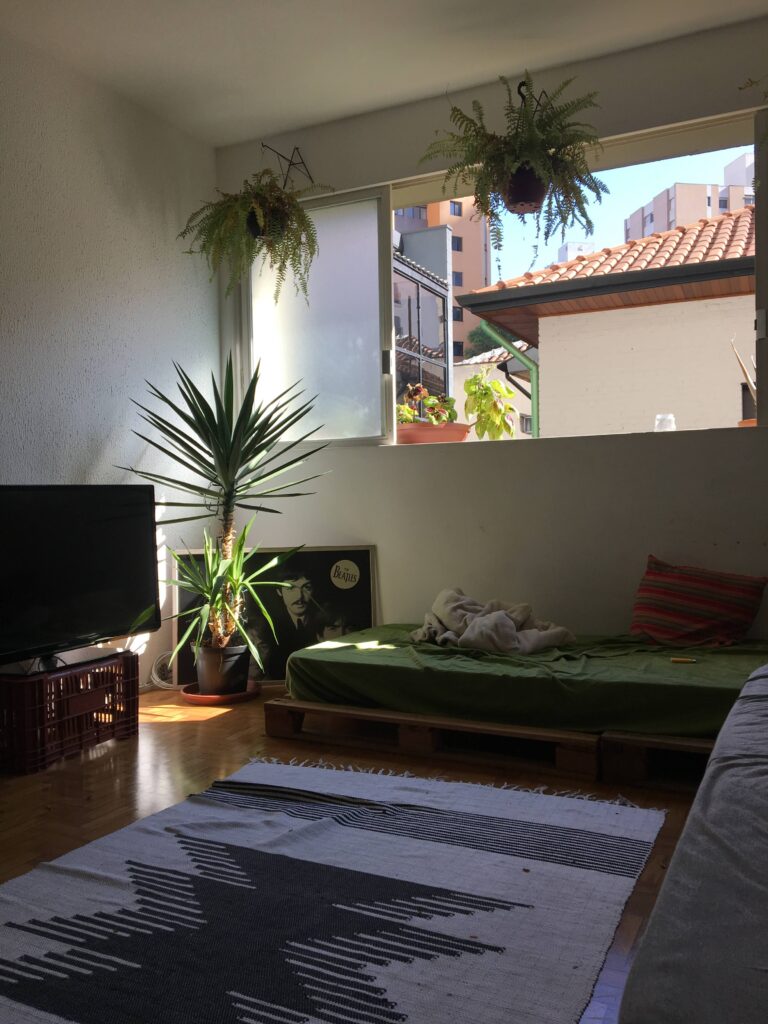
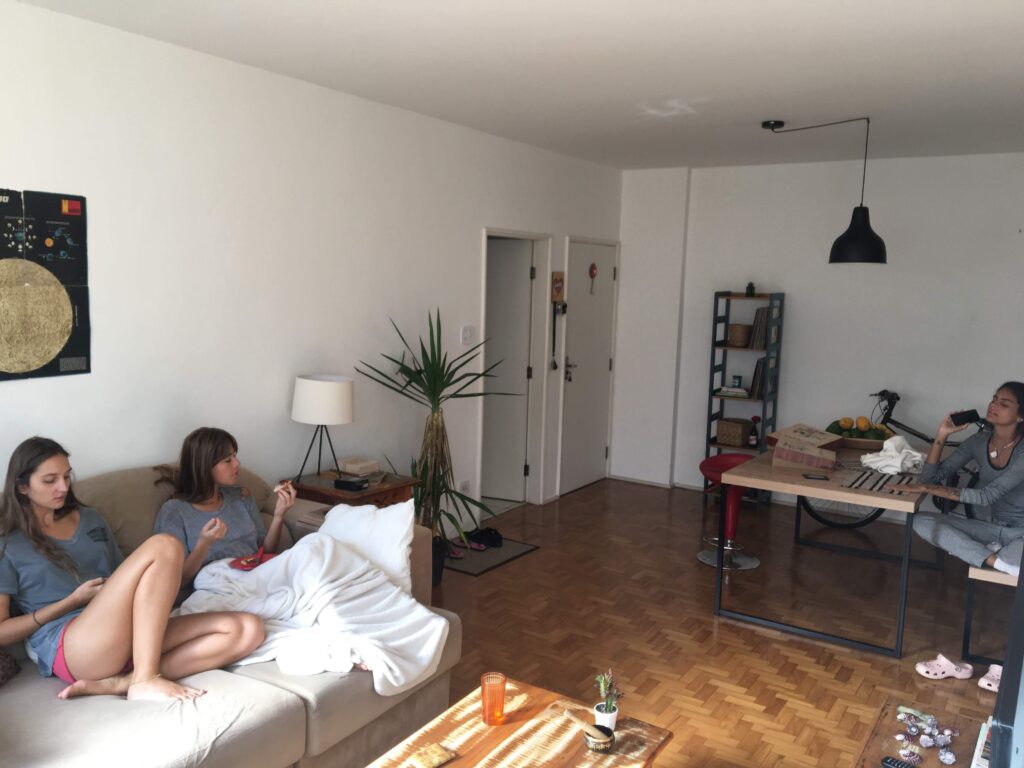
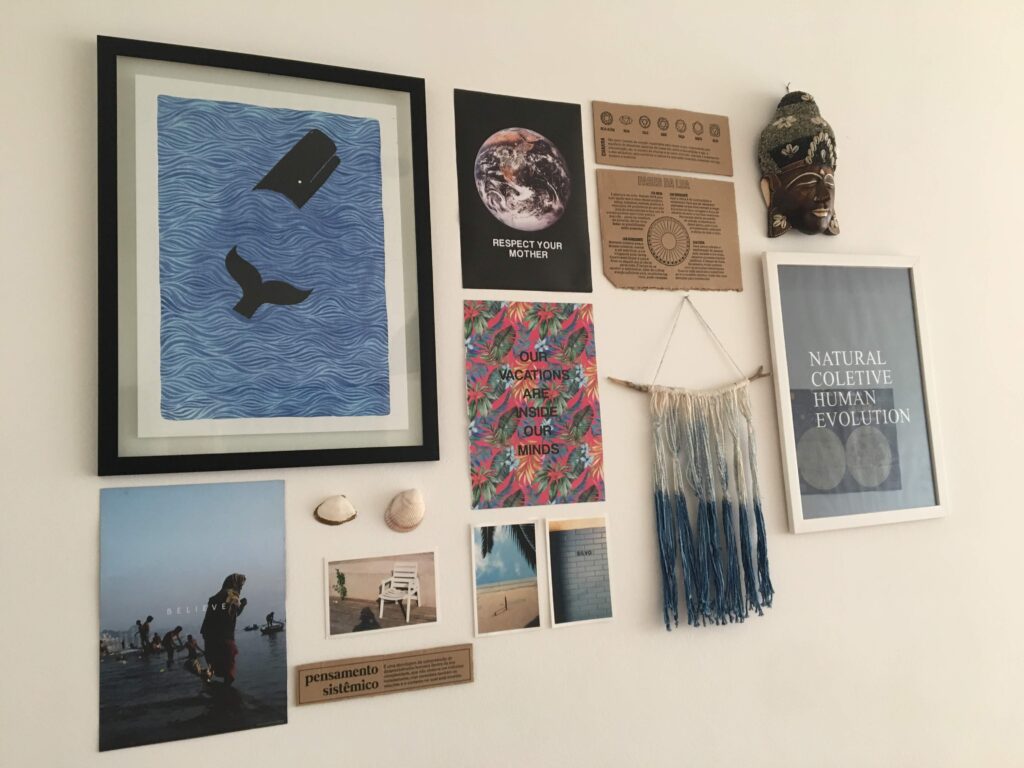
The apartment is approximately 100 years old, and most of our neighbors are retired. One day, I borrowed a can opener from my neighbor and felt like I had stepped back in time to the 1950s. I love those photographic projects that capture the essence of living in a building, showcasing the diverse ways people make their homes (example). I wish I could do something similar here.
Anyway, the apartment is quite spacious. I’m particularly fond of the bathroom tiles and the ones in the kitchen that resemble a weed pattern. The simple yet hipster-inspired decor the girls have put together is charming. This is my second time sharing an apartment with women, and I must admit that, perhaps because I’m older now, it’s been a bit more challenging.
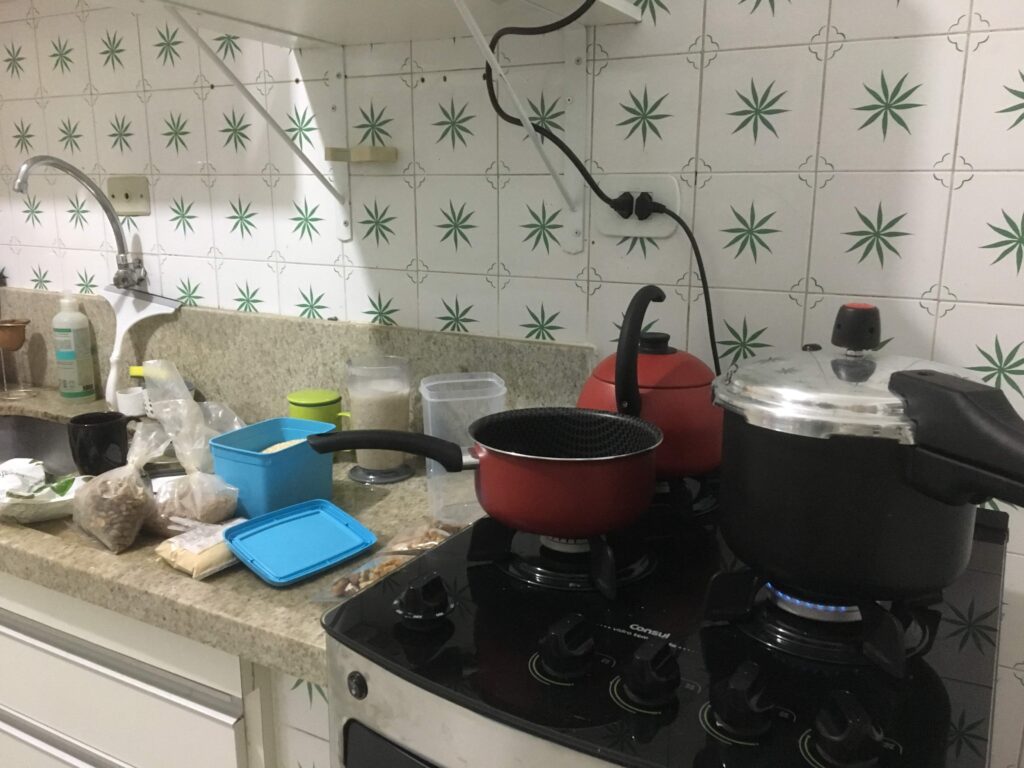

The two main bedrooms are roomy, but the one I rented is a spare one, and it’s what we’d call here in Brazil “the maid’s room.” It’s a small, windowless room, typically located in the laundry area, where maids used to live in their employers’ homes decades ago—some still do today. (you can check this amazing Ana Muylaert’s movie about this topic)
I chose to rent it because it’s incredibly close to the technical school where I’m studying. It allows me to save a significant amount of money on transportation and housing costs, which can be the most expensive part of many people’s budgets. I’m currently focusing on investing the surplus money in real estate funds, as I’ve been diving into learning the ins and outs of the FIRE (Financial Independence, Retire Early) movement for almost a year now.
So, let’s delve into a discussion about architecture, minimalism, my room, and my tech career.
welcome to my extreme minimalist new life
This 4sqm room sets me back R$800 a month. To give you some perspective, my previous apartment in São Bernardo, close to the university, had two bedrooms and cost me less than 2k per month, with all the expenses included.
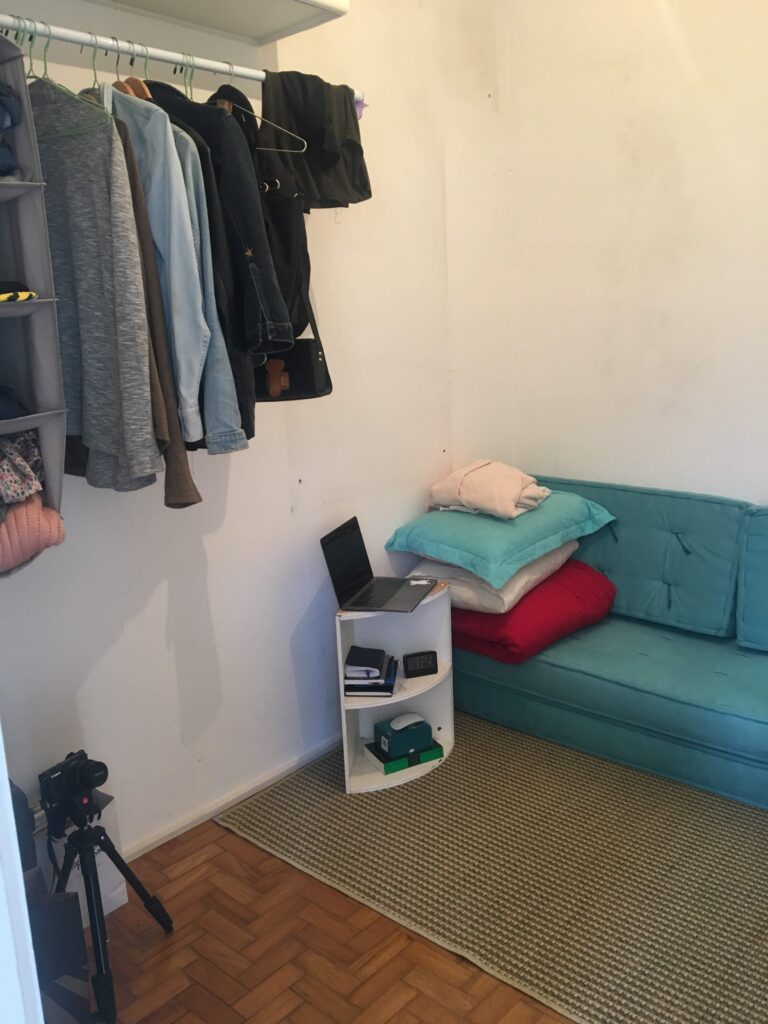
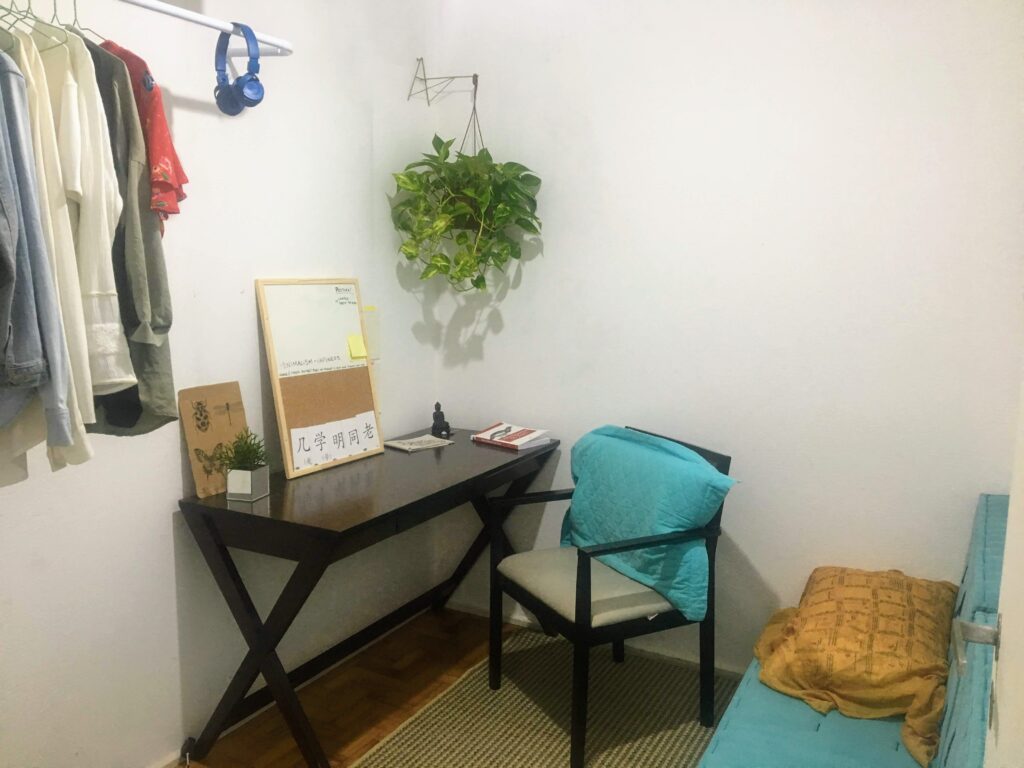
Now, you might be wondering why I made the switch. Mostly because the cost of commuting does not worth the prize, for my health, neither my pocket, as Mr. Money Mustache already said in the past.
The room’s most significant advantage is I can skate to school in just 7 minutes, its mere two-block distance from Paulista Avenue and its proximity to the metro.
This neighborhood is notorious for its high prices. In this context, what I’m paying here is incredibly budget-friendly. Typically, people in this area shell out at least 2k a month for a room.
While my room lacks windows, upon opening the door, I’m greeted by a relatively large laundry room window. And I love the hardwood floors.
As you can see, my commitment to minimalism has reached impressive heights. I still keep my blue futon and one of my plants, but I sold that beautiful Japanese clothes chest (remember it?) and bought this nice second-hand desk. Now, checkout the closet, a bit reduced in comparison with the last year ahah The two-door cabinet above this clothing rack constitutes my entire storage solution, aside from the kitchen essentials I’ve brought along.
And actually, here are my 2 favorites for the moment:

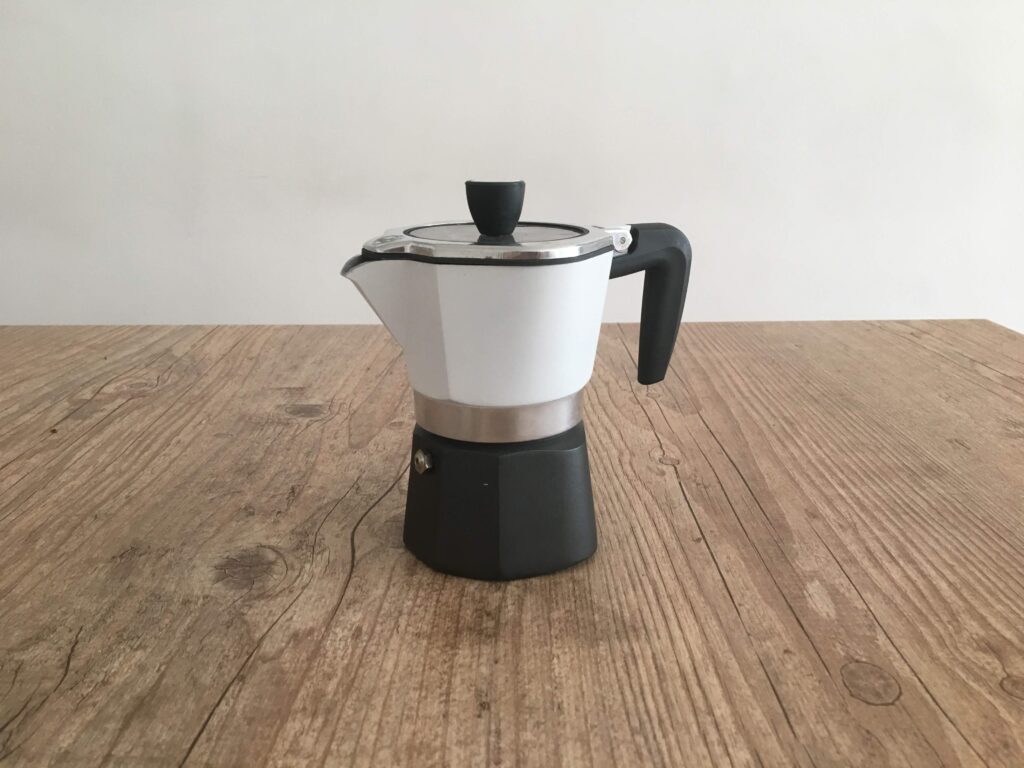
- This silicone device is a practical way to make popcorn from corn in the microwave (amazon link)
- And this little Moka pot, the Italian coffee maker, always reminds me of my grandma (though she has, of course, the large version of it) (amazon link)
the maid’s room
The residences in Brazil, mainly in São Paulo, featured maid’s rooms due to both social and gender issues. After the abolition of slavery, domestic labor in Brazil underwent transformations, with a new family structure emerging, where unpaid domestic work was primarily performed by women. This change resulted in the creation of the maid’s room, combining the living and working spaces. The bedroom often served as a space for sleep, clothing, and meals in exchange for the maid’s service and obedience to the lady of the house.

The 1988 Constitution further reinforced principles of gender equality in Brazil, and there are even more specific rules governing domestic maids, such as…
- Law No. 5.859/1972: This law, enacted in 1972, specifically addresses the profession of domestic employees and outlines the rights and responsibilities of both employees and employers.
- Constitutional Amendment No. 72/2013: This constitutional amendment, implemented in 2013, marked a significant milestone by equating the rights of domestic employees with those of other workers. It extended various benefits, including overtime pay, the right to the FGTS (Fundo de Garantia do Tempo de Serviço or Severance Indemnity Fund for Employees), unemployment benefits, and other labor rights.
- Complementary Law No. 150/2015: Commonly referred to as the “Domestic Workers Law,” this legislation, enacted in 2015, serves as a comprehensive regulation of domestic workers’ rights. It specifies working hours, overtime rules, break times, paid weekly rest, night shift bonuses, and various other aspects of domestic employment.
While legislation improved domestic workers’ rights, the maid’s room are still perpetuated in the design of new apartments, so it continues to persist in social customs and some architectural projects, serving as a reminder of historical inequalities.The maid’s room, often overlooked in discussions of modern architecture, carries a profound historical significance
transition to a tech career
Finally, but not the least, after years of contemplation, I’m taking the plunge and putting my ideas into practice by embarking on a career transition into the tech industry.
I’ve enrolled in a school that functions similarly to a boot camp. If I successfully pass the project test we’re currently working on during this first semester, they’ll assign me to one of the program’s partner companies.
It’s a full-stack project for a team of five, in addition to individual assessments. The group project itself is an extensive undertaking – a complete application integrated with an Arduino board, encompassing hardware connections, database management, back-end and front-end development.

I’m now in my late 20s, and I haven’t pursued what most people would call a ‘traditional career.’ I’ve worked as a yoga teacher, spent time volunteering with NGOs, and held various odd jobs like working as a public server in a school, handling administrative roles in real estate, and even being a vendor during the bustling Christmas season in shopping malls.
While many of my friends are now married, have children, and have built stable careers or started their own businesses, my cousins have secured positions in large companies as engineers, economists, or in administrative roles.
To some, my choice to reside in this modest room and embark on a journey of learning something entirely new might seem unconventional or even eccentric. Dealing with the judgments of others is not easy.
But I have no regrets about my unique path.
I believe it’s essential to emphasize that there isn’t just one to five universally applicable narrative for success that fits every corner of the world. I find it hard to swallow the idea that we must conform to a singular notion of success, and I can’t respect those who look down on people for not following a predetermined path.
True success should lead to a broader perspective on life and a more empathetic way of viewing others. It’s the kind that contributes to a polarized world.
After this rage, I must say that these have been the challenges so far have been sharing apartment with people I just met and working side by side with very young people at the bootcamp.
The parts I thought would be harder are actually the most rewarding.
For instance, living with so little has allowed me to save a substantial amount of money (keeping in mind my middle-class circumstances here). Learning highly technical skills has brought me a sense of flow that I haven’t experienced in a long time. Dealing with the judgments of others has been shaping my world perspective and my values.
I believe that I would never have experienced these feelings so profoundly if I hadn’t immersed myself experientially in this lifestyle. For that, I owe a debt of gratitude to the principles of Buddhism and yogi philosophy I’ve been studying for years, as well as the influential insights shared on the internet by individuals like Cait Flanders, Fumio Sasaki, and Youheum.
That, in and of itself, answers the common question, “Is it too late to enter the tech job market?” I believe you can attempt any career at any age, but it’s crucial to be realistic about our unique circumstances.
Our positioning in each situation plays a vital role.
It took me a long time to consider entering the tech job market because I thought I would die on the beach, “morrer na praia” (a Brazilian expression that means coming close to success but failing right at the end), especially during job interviews. I’ve always struggled with them, and it has been the primary obstacle I’ve faced in my entire career search.
Now, I believe I’m well-positioned for success since the school itself will place me in a company without requiring an interview—although I should note that these first six months serve as a significant interview process in their own right.
Let’s see how the next chapters unfold 🏊



Leave a Reply